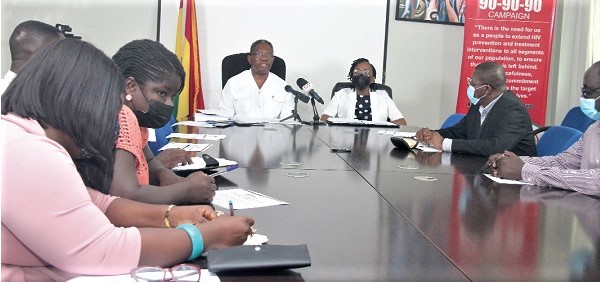
AIDS Commission marks Zero Discrimination Day
The Ghana AIDS Commission (GAC) has commemorated the United Nations ‘Zero Discrimination Day, reminding the public that stigmatisation and discrimination against persons living with HIV is the major challenge to the national HIV response and targets.
It mentioned what such persons suffer from includes denial of employment, denial of rental housing, education, police assistance, eviction from rented houses or family house, disclosure of status to third parties and refusal to share social amenities with them.
Advertisement
At a press briefing to mark the day in Accra on March 1, 2022, the Director-General of the GAC, Dr Kyeremeh Atuahene, appealed to the public to desist from treating such persons and other vulnerable people differently due to their health status.
He said although it was against the laws of the country to indulge in such acts, discrimination and stigmatisation against persons living with HIV persisted and was very high.
“HIV stigmatisation and discrimination are unimaginably pervasive in the country. According to the Demographic and Health Survey conducted by the Ghana Statistical Service in 2014, 92 per cent of women and 85 per cent of men expressed unacceptable attitude towards persons living with HIV.
“Results of this survey clearly demonstrate that ignorance and misconceptions about HIV drive such unacceptable levels of stigma and discrimination against persons living with HIV. Several studies conducted in Ghana on HIV-related stigma and discrimination show that the experience of stigma and discrimination is a daily occurrence in homes, schools, churches, workplaces and communities.
“These findings have been confirmed by data from the discrimination reporting system of the Commission of Human Rights and Administrative Justice (CHRAJ),” he said.
He said all acts of stigmatisation and discrimination against PLHIV or affected parsons were offences punishable by law.
He assured PLHIV to have confidence in the law, as it had made provision for free legal assistance and hearings in camera to protect their identity and status.
Impact on society
Dr Atuahene said the effect of discriminating against and stigmatising persons living with HIV included increasing the vulnerability of the public to the public health condition.
He explained that it was so because although HIV positive was not a death sentence due to the potency of antiretroviral drugs to suppress viral load to limit spread, when people with the condition were discriminated against and stigmatised, they coiled in and often did not access the needed treatment services.
Dr Atuahene said the phenomenon also deterred people from testing to know their status, hid their status and in some cases did not go for treatment.
“When it happens like that, the larger community is at risk because the level of viral suppression cases would be low, more people will get infected and the national target to end AIDS by 2030 will continue to be challenge,” he said.
He said although the daily infection rate had decreased from 200 to 60 in the last five years, the prevalence was very high, with an annual average of 21,000, and required an all-hands-on-deck approach to resolve.
“The day is observed annually to promote equality and fairness before the law and create awareness and fight the systemic and cultural discrimination against people living with HIV,” he said.
The Day
The 2022 commemoration is on the theme: “Remove laws that harm; create laws that empower. UNAIDS is highlighting the urgent need to take action against discriminatory laws.”
Marked every March 1, the day was Instituted by the UN to promote equality before the law and in practice throughout all the member countries of the UN.
It is also marked to create awareness of the right of everyone to live a full and productive life, and live it with dignity, while highlighting how people can become informed about and promote inclusion, compassion, peace and, above all, a movement for change.
Zero Discrimination Day is helping to create a global movement of solidarity to end all forms of discrimination.
UNAIDS /Association
The Country Director of UNAIDS, Angela Trenton-Mbonde, said the UN had set aside the day to turn the spotlight on one of the biggest challenges faced by societies today — discrimination.
“It is a day for us to think about the meaning of discrimination and how discrimination affects the lives of people experiencing it.
Discrimination refers to the selective practice of unfairly treating a person or a group of people differently from others due to factors such as religion, gender, race, age, disability.
“To end AIDS by 2030 and to achieve the Sustainable Development Goals, we must confront discrimination. Tackling inequalities and ending discrimination is, indeed, critical to ending AIDS.
“I urge all of us to not discriminate and also fight against discrimination and stigmatisation. Ending discrimination and changing laws are the responsibility of us all. Everyone can play a part in ending discrimination and can try to make a difference, in ways both big and small,” she said.
The President of the National Association of Persons Living with HIV, Ms Elsie Aryeh, said discrimination and stigmatisation reduced the quality of their lives, stressing that the two killed affected persons more than AIDS.
She expressed gratitude to the GAC, the UNAIDS and other stakeholders for their support to persons living with the condition, which included creating the enabling environment for them to live in dignity, good health and self-worth.
Writer’s email: [email protected]



